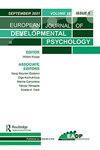在COVID-19封锁期间玩电子游戏与青少年健康有关吗?情绪自我效能感与积极应对的关系
IF 1.9
4区 心理学
Q3 PSYCHOLOGY, DEVELOPMENTAL
European Journal of Developmental Psychology
Pub Date : 2022-11-20
DOI:10.1080/17405629.2022.2148651
引用次数: 2
摘要
在COVID - 19大流行期间,青少年使用电子游戏与他们的幸福感之间的关系存在争议,并且在很大程度上未被探索。本研究调查了全国封锁期间(2020年3月至5月)青少年电子游戏使用与幸福感之间的关系,并调查了这种关系是否由情绪自我效能介导,并由积极应对调节。该研究涉及168名14-19岁的意大利青少年(M = 16.6岁,SD = 1.6)。数据是通过匿名在线问卷收集的。有调节的中介分析表明,玩电子游戏通过中介情绪自我效能感,与较低的健康抱怨和较高的情感幸福感间接相关。此外,积极应对对电子游戏使用与情绪自我效能之间的关系有调节作用。结果表明,情绪自我效能和积极应对均能使青少年在居家隔离期间从玩电子游戏中获益。本文章由计算机程序翻译,如有差异,请以英文原文为准。
Is playing video games during COVID-19 lockdown related to adolescent well-being? The role of emotional self-efficacy and positive coping
ABSTRACT The relationship between adolescents’ use of video games and their well-being is controversial and largely unexplored during the COVID −19 pandemic. This study examined the association between adolescent video game use and well-being during a nationwide lockdown (March-May 2020) and investigated whether this association was mediated by emotional self-efficacy and moderated by positive coping. The study involved 168 Italian adolescents aged 14–19 years (M = 16.6 years, SD = 1.6). Data were collected through an anonymous online questionnaire. Moderated mediation analysis showed that playing video games was indirectly associated with lower health complaints and higher affective well-being by mediating emotional self-efficacy. In addition, positive coping was found to moderate the relationship between video game use and emotional self-efficacy. Results indicate that both emotional self-efficacy and positive coping enabled adolescents to benefit from playing video games in terms of individual well-being during home confinement.
求助全文
通过发布文献求助,成功后即可免费获取论文全文。
去求助
来源期刊

European Journal of Developmental Psychology
PSYCHOLOGY, DEVELOPMENTAL-
CiteScore
3.70
自引率
0.00%
发文量
35
 求助内容:
求助内容: 应助结果提醒方式:
应助结果提醒方式:


